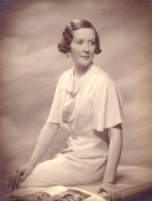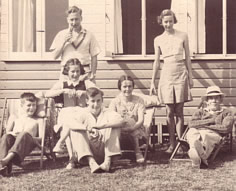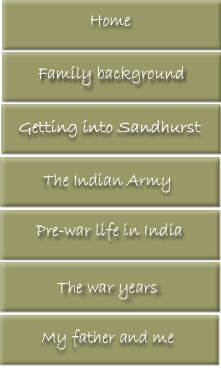
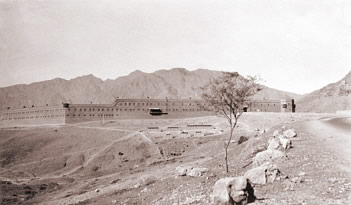
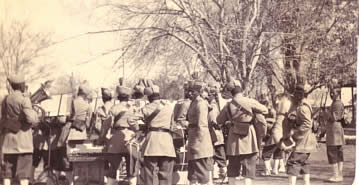
The pre-war life of an Indian Army officer
So a year has passed and John has to choose an Indian Army Regiment. He writes that he was advised by his British battalion Commanding Officer to apply to a mixed race battalion with 50% Hindu, 25% Punjabi Muslims and 25% Muslim Rajputs and, by chance, there is a vacancy in the 2nd Battalion IX Jats. He joins on 13th November 1934 writing in his memoirs: " and I can truthfully say that the happiest days of my bachelorhood were about to commence.”
The battalion was stationed at Shagai Fort six miles up the Khyber Pass from the Indian end. He occupied the British Officer's quarters on the top deck of the fort, the last two windows on the top left in the photograph at the bottom of the page. To me Shagai seems the epitome of the Northwest Frontier; my father also thought it romantic, but a bit of a 'hellhole' in both summer and winter. He writes
“The wind in winter used to come howling through the Ali Masjid gorge and as my bathroom door was very ill-fitting, it - the wind - seemed to come straight into my bathroom. I used to have very quick baths.”
In a recording made in the 1970s my father talks about being paid £30 a month and living like a lord, yet still managing to save.
John went home three times between 1933 and 1939 and while on a short leave in 1935 he began the courtship of my mother, Edith Campbell. During that time the battalion moved up the Khyber Pass to Landi Kotal.
The 2nd Jats left the Khyber in October 1935 for Hyderabad, Sind by train via Peshawar, Lahore and then on to Hyderabad (see map). He never got over the thrill of travelling in that way. In 1936 my father was appointed quartermaster to his battalion and in 1937 he goes home for his long leave where he pays for his family to go on their first holiday ever.
In the November of 1937 he becomes Adjutant to the Battalion. He attends the Small Arms School in Pachmari and while there the battalion moves to Chaman on the border of Afghanistan. The journey would be the usual leisurely train trip up north from Hyderabad, Sind to Sukkur, onwards over the Indus to where the frontier hills begin and through the Bolan Pass to Quetta (see map).
My father writes that while war now seemed inevitable, life went on as normal; training, parades, annual inspections and guest nights in the Mess continue - with the band playing on.
